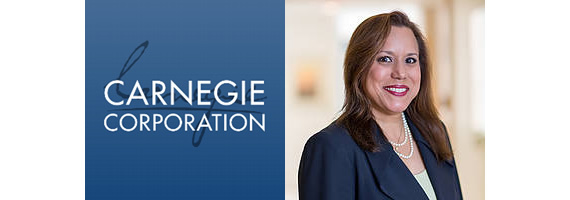LaVerne Evans Srinivasan, the new Vice President of Education Programs at Carnegie Corporation of New York, speaks with Deanna Lee, the Corporation's Chief Communications and Digital Strategies Officer, about finding inspiration and innovation.
You have held many interesting jobs ranging from general counsel of a major record label to deputy chancellor of the New York City Department of Education. What brings you to this moment at Carnegie Corporation?
There has always been a very strong focus on the importance of education in my family. My great-grandparents were educators and my father was a professor, a practicing physician, and a pioneer in the field of ultrasound. My family's focus on excellence and education had a profound impact on my values and career. That, coupled with my academic and professional experiences over the years, has reaffirmed my desire to work on education reform for the benefit of all children. My career experiences give me a diverse perspective on the work of our grantees and our role as a funder in catalyzing and supporting change in education. I feel honored to be leading Carnegie Corporation's education programs.
After graduating from Harvard Law School, you ended up with big jobs as legal counsel for Sony Music and then BMG Entertainment. How does that tie in with your work today?
I've always been fascinated with systems, people, and large-scale change. When I was in the music industry, Napster came on the scene, and technology was beginning to have an impact on the field. We had to think about how the music industry was going to respond to the Internet, and how we should think differently about our work and our customers. So I had an opportunity to learn about how a field responds to change.
How did this prepare you to become a deputy chancellor?
When I transitioned into education at the New York City Department of Education, the first thing that struck me was how critically important people were, from teachers to school leaders, in terms of having an impact on student outcomes. We needed ways to better prepare them, support them, and to identify and cultivate more talent throughout the system. A significant piece of my work was focused on what we now refer to as "human capital," or the people side of the education system, which became the signature for much of the time that I've worked in education. I had also come from a highly decentralized global company and had a keen understanding of how to work effectively with people across cultures to drive systemic change.
You came to Carnegie Corporation initially as program director for, appropriately, teaching and human capital. How do you see yourself fitting in here?
This is the perfect place for me because I have a background in understanding how organizations work and function, and how urban public education functions, based on my varied and deep engagement in the education sector. The Corporation has a long history as a standard-bearer of excellence and equity in education, and I look forward to upholding those commitments. We have a passionate and dedicated team in Education Programs and I am excited to work with them to expand opportunity for all students through systemic improvement of our educational system.
So often now, all we hear about are the negative things going on in education. What are your hopes for the future, what enables you to be so optimistic?
What drives me is the sense of possibility that we can make a difference for every kid in this country. And the reason that I have optimism is that every day I see examples of innovative thinking, continuous and data-driven enhancement programs that are serving some students very well, and grantees that are committed to the goal of improving education for every child in this country. For example, even with the implementation challenges of higher standards, there is an opportunity to maintain high expectations for all students. And the focus on STEM teaching and learning remains strong.

